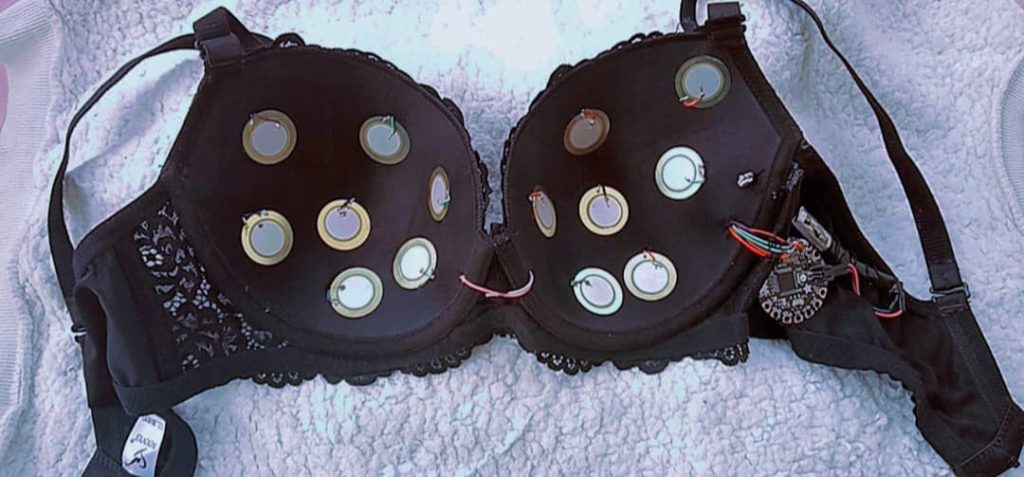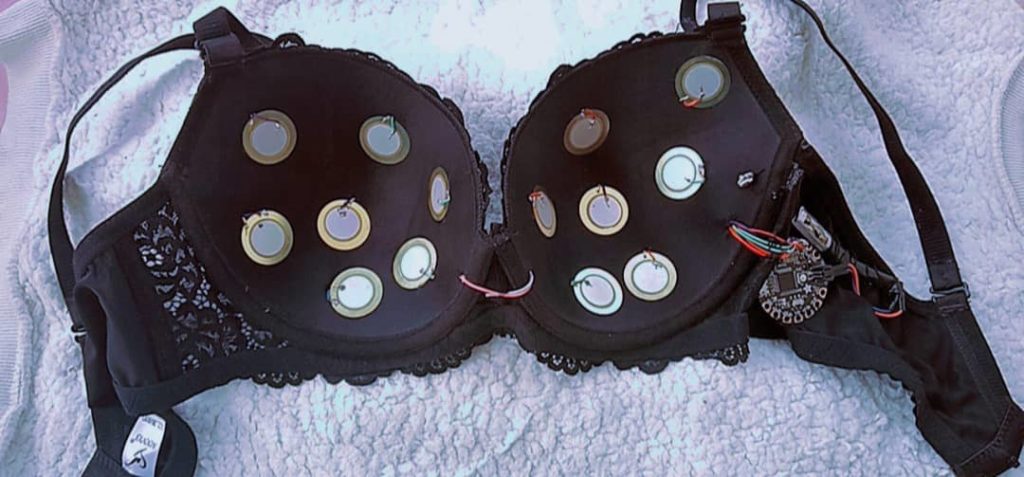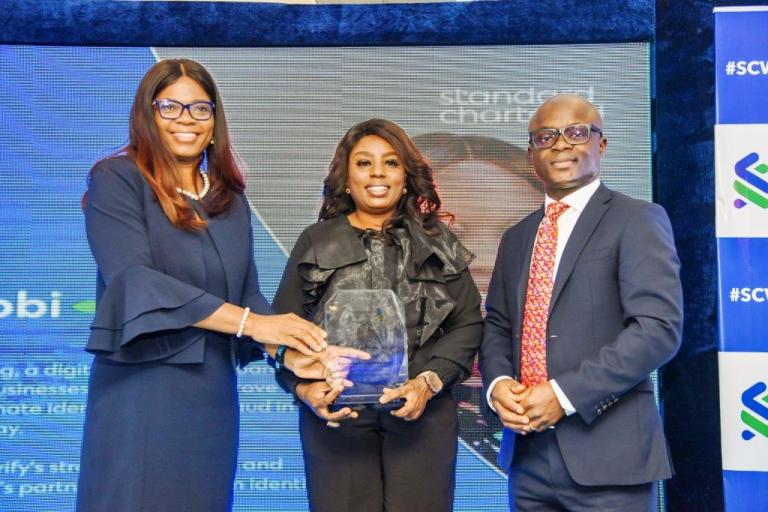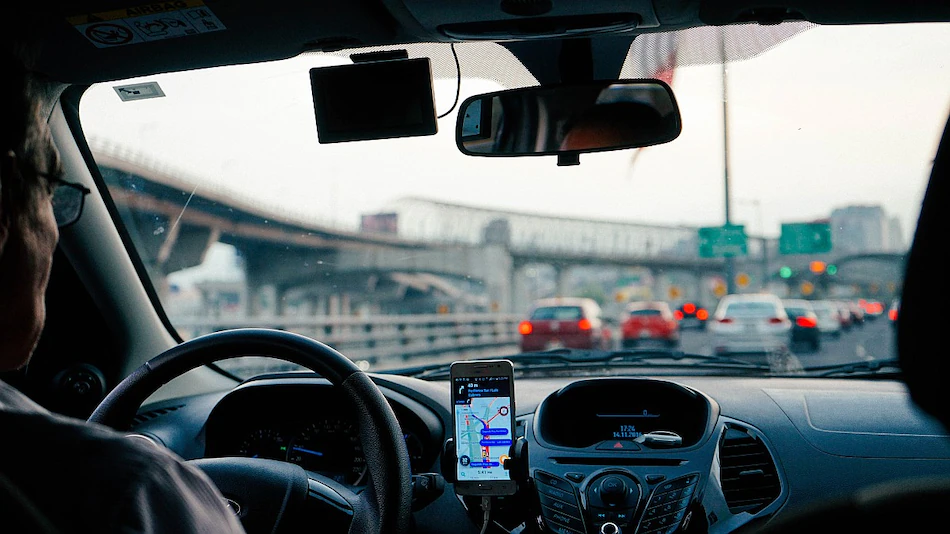Meet Kemisola Bolarinwa, the CEO of Nigeria’s first wearable tech startup, Nextwear Technology

Kemisola Bolarinwa dreamed of becoming an innovator as a young girl. Her favorite secondary school subjects were math, physics, and chemistry. Her STEM interests prompted her to join the Junior Engineers, Technicians, and Scientists (JETS) club at her secondary school, St. Helen’s Unity Secondary School, Ondo.
The JETS club was founded to introduce students to the STEM field and provide them with hands-on experience. She represented her school in various competitions as a club member, one of which she remembers fondly. In 2006, Kemisola and another student from their school built a radio transmitter and receiver that placed third in a national JETS club competition in Jos, Nigeria.
“The club deepened my interest in stem because I was able to get hands-on experience from what we were taught in school. Going out as a young girl and meeting my counterparts to test my knowledge deepened my interest in STEM.”
She studied Electrical and Electronics Engineering at the University of Ado-Ekiti to pursue her dreams. This program of study can be thought of as a springboard for all of her dreams, which are now about to come true.
Kemsiola is now the CEO of Nigeria’s first wearable tech startup, Nextwear Technology.
Nextwear Tech creates technology that is worn close to the body by embedding programmable electronics and sensors on clothing to address societal issues such as health and communication.
Gender Differences in STEM
Kemsiola reveals a pattern she noticed in an exclusive interview with Technext. The gender gap is something that most women are all too familiar with.
In the engineering faculty, the CEO’s department, electrical and electronics engineering, there were only 11 female freshmen. By the third year, some students had transferred to other departments, and only seven had graduated.
Kemisola is a female advocate who is working to close the gender gap and encourage girls and women to pursue careers in STEM.
It is a global challenge especially when it comes to engineering. That’s why I came up with the Stem Gender Gap where I advocate for this issue.
Kemisola.Bolarinwa, CEO Nextwear Technology
In terms of education, she stated that the current educational system does not support the practical system of learning. She attributed this to overcrowding in schools with limited or antiquated resources.
“It’s impossible to overlook hands-on learning.” Hopefully, the government will reconsider the curriculum in order to promote more hands-on learning. I believe that seeing real-world applications piques your interest more than paperwork, as was the case with me. “I use myself as a model because hands-on experience broadened my mind and piqued my interest in technology.”
Kemisola, in terms of education, is a self-taught robotics engineer. She discovered that her career options were limited by the environment in which she found herself after graduating as an Electrical & Electronics engineer. Another realization she made was that she lacked the skills required for the new wave of technology.
I graduated in 2010 and the new age skills essential for this 4th industrial revolution like Robotics and IoT wasn’t taught then. The university gave me fundamental knowledge but not what I actually needed.
Kemisola describes the next step in her journey as a life-changing one that will serve as the foundation of her career. The next step was to join Baun Robotics, where she began her journey into the world of computing language and programming, all thanks to her incredible boss’s support.
‘My boss allowed us to use his resources, money, and internet to learn because this type of education was not widely available in the country.’ He was extremely helpful. I was able to learn the programming language C++ used in robotics, which I was previously unaware of. ‘I was able to learn at my own pace by watching videos and reading texts,’ she says.
She has further gone ahead to get certificates in order to validate the knowledge she learned.
Nextwear Technology innovations

Kemisola describes the next step in her journey as a life-changing one that will serve as the foundation of her career. The next step was to join Baun Robotics, where she began her journey into the world of computing language and programming, all thanks to her incredible boss’s support.
‘My boss allowed us to use his resources, money, and internet to learn because this type of education was not widely available in the country.’ He was extremely helpful. I was able to learn the programming language C++ used in robotics, which I was previously unaware of. ‘I was able to learn at my own pace by watching videos and reading texts,’ she says.
Interestingly, Kemisola’s boss not only gave her room to grow, but he also exposed her to various areas of emerging technologies, such as wearable technology, in which she now works.
Kemisola enjoys researching, so when she learned about wearable technology, she dove right in. She tragically lost her aunt to breast cancer, and the thought of finding a solution took root in her mind.
In 2020, there will be 2.3 million new cases of breast cancer and 685 000 deaths worldwide. As of the end of 2020, there were 7.8 million women alive who had been diagnosed with breast cancer in the previous five years, making it the most common cancer in the world.
Breast cancer is a threat to women globally regardless of status. I took it as a challenge. When I gained knowledge in wearable technology, I worked on it.
Early detection is the most effective way to defeat cancer. So, Kemisola and her five-person team developed a product that could detect breast cancer simply by wearing it on the body for about five minutes. Smart Bra was the name given to this product. On the team are an oncologist and a cancer researcher who help to provide insight into the medical aspect of ensuring product efficiency.
In 2021, the team created a working prototype and conducted a local trial, or “troubleshooting,” as Kemisola calls it. They achieved 87 percent accuracy and are now working to advance it to the Minimum Viable Product (MVP) stage so that they can conduct a clinical trial.
Nextwear Technology already has a product on the market: a necklace that also functions as a tracking device. A guardian can track the wearer of the necklace’s journey using the mobile app. This product was developed in response to the nation’s state of insecurity. Nextwear Tech has sold over 300 units since its launch last year. According to the mother of one, this is because the startup has not done much marketing, but that is about to change.
This shift is due to the fact that the SmartBra innovation has brought them some publicity, which has allayed people’s concerns about Nigerian-made products.
‘The publicity from the smart bra has helped because they no longer have the usual skepticism about “Naija made” products. The smart bra has demonstrated that we are capable of producing high-quality products.’
All of these brilliant inventions have come at a price. Kemisola says of the funding process, “I can tell you that I am exhausted.” The self-funded startup has spent approximately $4 million on SmartBra alone, which includes the cost of purchasing the necessary hardware as well as visits to various teaching hospitals to meet with oncologists.
Hardware development is capital intensive and requires a lot of time. It takes time to get it right. Funding has to be there because you have to come up with prototypes as you can’t get it on the first try.
Nextwear Technology is looking to raise funds in a pre-seed round, but will not do so until it has a product ready for mass production. Kemisola was a recipient of a $10,000 grant in the Standard Chartered Women in Technology Incubator Programme (SC-WITI) in Nigeria.

Kemisola is looking for more grants and angel investors to help fund the project, which hopes to include an international clinical trial and a mobile app that allows bra wearers to track their progress.
After meeting with the Minister of Science and Technology for State, Abdullahi Mohammed, Kemisola received recognition from the Federal Government of Nigeria for her work.
She also mentions global recognition, citing the fact that people from all over the world have expressed interest in the work.
“Because people are interested, we’ve received responses from all over the world.” The market is there, people are expecting us, and we cannot let them down. We’re working on improving our accuracy.”

The product’s development has been slowed because the necessary components are not available in Nigeria. Orders must be placed, and delivery can take weeks or even months, which presents a challenge for the team.
When speaking with Kemisola, it is clear that she is confident in her abilities. When asked about other difficulties she faces, she says gender stereotyping was once one of them, but she overcame it by speaking up and believing in herself.
Gender stereotyping is no longer a challenge for me, but it was in the beginning. Because I speak, I was able to defeat that challenge. You can’t look down on me or underestimate my abilities.
This is also the advice she gives to young ladies.
“The first step is to believe in yourself, your abilities, and your potential. You might get discouraged if you don’t have that.”
She encourages other women, regardless of age or educational background, to pursue careers in technology.
It is not too late to venture into tech. No matter your background or discipline, I would advise you to have basic knowledge in tech so you don’t get lost.
The inventor is optimistic about the future. According to Kemisola, Nextwear Technology is planning to launch more wearable technology products in communication and fashion.
“We also have products in communication and fashion on the way.” We want to put on a runway show with our tech meets fashion wears during GT Fashion Week. People should keep an eye out for us.”






